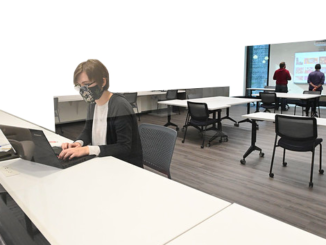
Miya Medina
Staff Writer
January, 9 2019
In the fall semester of 2017, the Adjunct Advisory Committee was created in efforts to consider the needs of adjunct professors. The committee meets monthly and has a total of thirteen members from different departments.
According to Yasemin Ersun-Hallsby, co-chair of the committee and adjunct professor, The Adjunct Advisory Committee’s mission is to further improve the adjunct community to benefit the professors, as well as the students, and the school as a whole.
“We’re a group of adjuncts who are interested in helping the adjuncts with different backgrounds to have a good, fulfilling, satisfying experience and in the process, help our students so that everyone is benefiting from this positive level of interaction,” she said. “The Adjunct Advisory Committee’s mission is to hear the voices of the adjuncts.”
Dominican University employed over 200 adjunct faculty last semester. That is roughly a two to one ratio of adjuncts to full-time faculty. These numbers can fluctuate every semester due to a multitude of reasons like decreased student enrollment or budget cuts.
In February of last year, the Adjunct Advisory Committee gathered for the first time officially to discuss the current state of adjuncts at Dominican. Every concern ranging from parking spots to benefits was brought up as possible areas of advancement.
“People want to feel committed to the university and it’s difficult to do that if it doesn’t feel like the university is committed to us.”
– Lannon”
The uncertainty of job security was one of the issues brought up at the meeting. Adjunct instructor and co-chair of the Adjunct Advisory Committee, Keegan Lannon, commented on the matter, “If enrollment numbers decline, they can let go of adjuncts. If the schools decides to go in a different direction and switch focus on majors, they can let go of adjuncts. There’s no job security for those teachers [adjunct faculty].”
Due to the lack of a contractual agreement between adjuncts and the university, professors may be unsure if they will still have a job come the following semester. On the other end of the spectrum, some adjunct faculty have been with Dominican for years, though they too do not have total job security.
In addition to this, Lannon also mentioned that there could be some compensation issues among the adjunct community, “It’s meant to be a part-time job, but even amongst that the amount of compensation that we get for the amount of work that we do, at times, feels unbalanced,” he said. “It’s not unheard of to have an adjunct teaching at two, three, or even four different colleges to try and make ends meet.”
Lannon stressed that there is no disparities between adjunct and tenured faculty quality of teaching. Adjuncts have the same qualifications, the same dedication, and the same energy that tenured faculty do, “The adjunct faculty, while we have different contracts, are not different educators.”
However, another issue adjuncts can face is a lack of office space which can hinder their ability to engage with students as there is no private place to discuss assignments or issues in class.
In an attempt to promote the committee and hear more of adjunct needs, the committee sent out a survey to all adjunct professors at the end of last semester.
They are expecting a more detailed report of adjunct concerns shortly after classes are back in session. The creation of this committee is helping to establish a stronger connection between adjuncts and the university. Lannon remarked, “In a lot of ways, the university does make us feel welcome and make us feel comfortable.”
The committee is working hard in improving the conditions of adjuncts so that Dominican can continue providing a quality work environment for its employees and a better education for its students. Lannon commented, “People want to feel committed to the university and it’s difficult to do that if it doesn’t feel like the university is committed to us.”
mmedina@my.dom.edu
Editor’s Note: It’s been brought to our attention that there are facts in this article that were not reported correctly. In paragraph eight, it states, “Due to the lack of a contractual agreement between adjuncts and the university, professors may be unsure if they will still have a job come the following semester.” According to Lannon, this is not quite right. Adjunct faculty “have a renewable contract, but not one that extends beyond the semester.” Also, in paragraph eleven, it states, “Lannon stressed there is no disparities between adjunct and tenured faculty quality of teaching. Adjuncts have the same qualifications, the same dedication, and the same energy that tenured faculty do.” According to Lannon, this was also incorrect “and something that could be used to drive a wedge between the tenured faculty and the adjuncts.” Lannon didn’t claim adjuncts and tenured faculty have the same qualifications. He said, “I did say we are qualified to do the job, but most adjuncts hold only an MA, not a PhD. I would not want to say to the full-time faculty that all adjuncts are identical accept in contracts. We are equally dedicated and committed educators, certainly, but the full-time faculty provide more to the university in terms of subject expertise, service and research.” We apologize for the inaccuracies.



